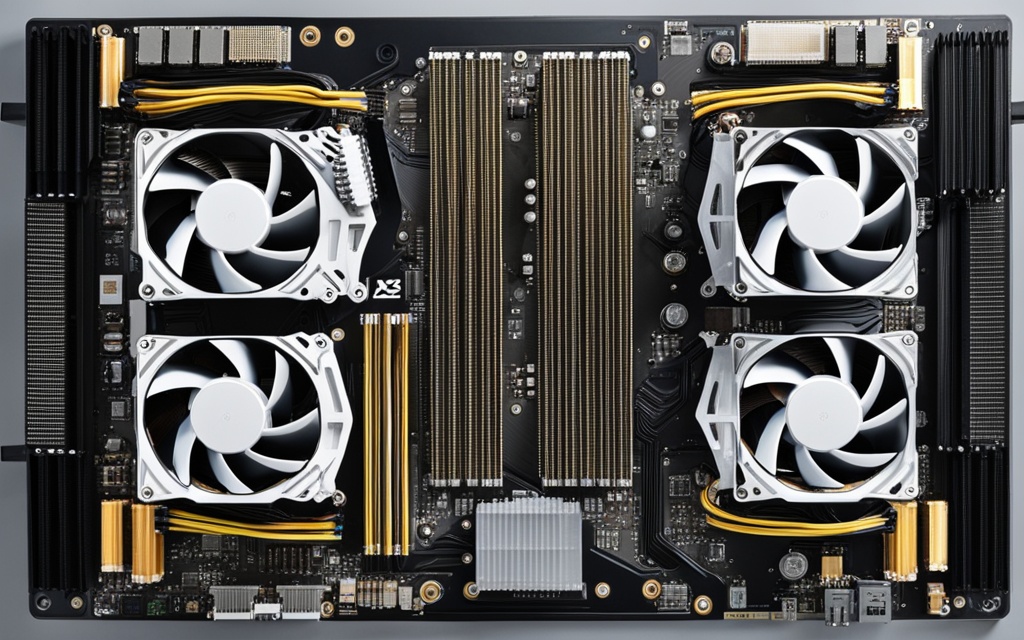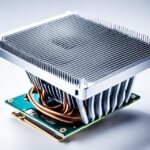Table of Contents
Knowing which CPU cooler you have is vital for your computer’s well-being and speed. The cooler keeps the CPU’s temperature in check, stopping it from getting too hot. This helps avoid the computer shutting down or getting damaged. There are many types of coolers, like air and liquid ones. So, understanding which one you have helps with upgrades or fixing issues.
Almost half of the users find it hard to spot their CPU cooler because it’s inside the PC case1.
Key Takeaways
- Understanding your CPU cooler is vital for optimising your PC’s performance and longevity.
- Almost half of PC users may find it challenging to visually identify their CPU cooler due to obstruction by other components2.
- Utilising your manufacturer’s website provides initial guidance on what CPU cooler do you have.
- Physical inspection can reveal key identifiers like brand logos or model numbers1.
- Compatibility with the CPU socket and mounting style is essential before replacing or upgrading coolers.
- Tools like CPU-Z can offer valuable insights into your CPU and cooler information2.
Understanding the Importance of a CPU Cooler
CPU coolers are crucial in computing. They keep your system stable and efficient by maintaining the right temperatures. If the CPU gets too hot, the performance drops, and it could get damaged. So, it’s key to know how a CPU cooler impacts performance for all users.
The Role of CPU Coolers in Your PC
A CPU cooler is important for your system’s health. It helps remove heat from the CPU, preventing overheating. This lets the processor work at its best3. For those looking to push their systems further by overclocking, choosing the right cooler is even more important. There are many coolers out there, like air coolers and AIO coolers, each with their own strengths.
How a CPU Cooler Affects Performance
A CPU cooler directly influences CPU performance. Good cooling means higher speeds and stable temperatures. Liquid coolers are top choice for those wanting the best cooling3. The size, power, and noise of coolers affect their performance and compatibility4. Without a good cooler, CPUs can overheat, which might lead to problems and even shutdowns5. Keeping your cooler in top shape is crucial for a great computing experience.
Exploring Different Types of CPU Coolers
Choosing the right cooling for your CPU involves understanding the two main types. Each type has its own unique benefits for your needs.
Air Coolers vs Liquid Coolers
Air coolers use fans and heatsinks to remove heat. This makes them a cost-effective choice for many. Tower coolers, ideal for high-performance CPUs, provide improved airflow with their design6. Low-profile cooloners fit well in small cases thanks to their compact size6. On the other hand, liquid coolers work by circulating coolant. They offer excellent cooling and quiet performance, perfect for top-tier CPUs like Intel’s i9 or AMD’s Ryzen 96.
Closed Loop Systems Explained
All-in-One (AIO) coolers are popular for their easy setup and efficiency. Though pricier than air coolers, they keep your CPU cooler with less noise78. While some air coolers can match liquid coolers in performance, liquid cooling is generally better at quiet heat management8. For unbeatable cooling, custom loop systems are an option but need more effort to maintain7. Your choice between air and liquid coolers will depend on budget, performance needs, and personal preference.
| Type of Cooler | Efficiency | Noise Level | Cost | Recommended Use |
|---|---|---|---|---|
| Air Cooler | Moderate | Higher | $ | General and budget builds |
| Liquid Cooler (AIO) | High | Lower | $$ | High-performance builds |
| Custom Loop Liquid Cooler | Very High | Variable | $$$ | Enthusiast builds |
| Immersion Cooling | Extremely High | Very Low | $$$$ | Data centres |
How to Check Your PC Manufacturer’s Specifications
To start checking PC specs, head to your PC manufacturer’s website. It’s the go-to for data on your CPU cooler’s model number. Knowing this helps judge compatibility and how well it performs.
Utilising the Manufacturer’s Website
The maker’s site is key for finding specs on your machine. Just enter your PC’s model number to see details like the CPU cooler. It also tells you the cooling needed for your PC to work well. Since a CPU can get really hot, good cooling keeps it running smoothly9.
Finding Information in the User Manual
The user manual has crucial info on your CPU cooler, covering your system’s parts. It might not name every cooler model, but it gives a good idea of the cooling design. Looking at your CPU cooler might also hint at its brand and model9.
Checking manufacturer specs often makes sure your cooler works right. Web forums are great for learning from others about different coolers. Cool identifying tools give deep details on what’s in your PC. It’s key to match your cooler’s socket type and TDP rating for the best choice9 and5.
| Manufacturer | Website Information | User Manual Information |
|---|---|---|
| HP | Provides detailed specifications for nearly all components. | Typically lists hardware used, may detail CPU cooler types. |
| CyberPowerPC | Includes comprehensive specs but may lack specific model details for CPU coolers. | Highlights system layout but may not detail every component. |
| Dell | Often lists cooling solutions and thermal performance indicators. | Usually outlines basic models of installed coolers. |
In short, using the manufacturer’s website and the user manual is the best approach to check your PC’s specs. It helps you truly understand how your cooling system works9.
Inspecting the CPU Cooler Yourself
Learning to check if your CPU cooler is working well is key to keeping your PC in top shape. First, make sure to take safety steps to avoid any problems during the check.
Safety Precautions Before Opening Your PC
Before you start, remember these important safety tips:
- Turn off your PC and unplug it to avoid electric shock.
- Touch a metal object to get rid of static electricity that could harm your PC parts.
- Handle the inside parts of the PC gently, as they are delicate and can be easily damaged.
Steps to Physically Identify Your CPU Cooler
After safety measures, you can now begin to find your CPU cooler. Follow these steps:
- Open the side of your PC case to see inside.
- Find the CPU cooler right above where the CPU is.
- Look for a logo or label on the cooler for info about the model.
- Check the heatsink or radiator for details on performance.
- Use software like CPU-Z or HWMonitor for a deeper look into how the cooler works.
Inspecting your CPU cooler this way helps you learn a lot about it. You’ll understand more about what your cooler does. This makes it easier to know if you need to make changes or get a new one.
| Cooling Type | Advantages | Considerations |
|---|---|---|
| Air Cooler | Good on the wallet, simple to put in, dependable | May be loud, limited cooling capacity, needs good case airflow |
| Liquid Cooler | Better at cooling, quieter | Harder to install, more expensive |
Following these steps means you effectively check your CPU cooler. It also boosts your knowledge on how it works and what it offers for your PC101112.
What CPU Cooler Do I Have?
Identifying your CPU cooler is key to keeping your PC running smoothly. Start by looking at the component in your computer. Knowing the model is useful for future updates, ensuring good performance.
The simplest way to find your CPU cooler’s model is by checking any labels on it. You can also look at your PC’s specs for this information. This will tell you what you need to know about your cooler.
CPU coolers come in various shapes to fit different needs. Know the TDP (Thermal Design Power) rating as high-performance CPUs need better coolers to handle the heat13. Air coolers are easy to install and cost less, while liquid coolers provide better cooling but need more care14.
Understanding your CPU cooler model and how it works with your system is crucial. Especially when you plan upgrades or changes. For compatibility tips, visit detailed guides here to ensure your cooler matches well with the CPU and motherboard1314.
Checking CPU Cooler Compatibility
Making sure your CPU cooler matches well is key when thinking about upgrades or new ones. Knowing your CPU socket type and how your cooler mounts is essential for a smooth setup.
Identifying Your CPU Socket
Start by figuring out your CPU socket type. It’s vital for making sure things match. Intel sockets usually start with “LGA”, while AMD ones start with “AM.” This is important to know because it helps you find coolers that fit your computer. Stock coolers come with CPUs, but aftermarket coolers often fit many different models because they’re designed to be more flexible15. AMD’s Wraith coolers, for example, fit a range of their CPUs, offering a good option for upgrades15.
Understanding Mounting Styles
The way a cooler mounts is also important. It ensures the cooler sits right on the CPU. Aftermarket coolers often have various brackets and backplates. This makes installation easier and more adaptable15. When choosing a mounting style, remember to check if there’s enough space for your RAM. Big coolers might not fit with tall RAM sticks3. Finally, check your computer case’s size limits to make sure the cooler will fit3.
| Socket Type | Brand | Interchangeability |
|---|---|---|
| LGA | Intel | Varies by model |
| AM | AMD | Commonly interchangeable |
With a clearer picture of how CPU sockets and mounting styles work, you’re set to pick the right cooler. Remember, the right fit is key for your computer to work well and last long153.
Conclusion
Knowing which CPU cooler to get is key for your PC’s top performance and long life. Coolers play a big part, and this guide has shown different types you can choose from. You might like a budget-friendly Vetroo V5 at $25-$3016, or splurge on the Arctic Liquid Freezer II 420.
This summary gives you the tools to check cooler compatibility, especially when upgrading. Knowing about thermal performance helps you avoid overheating. This keeps your PC’s parts safe. Coolers like the EK AIO Elite 360 DRGB stand out for their excellent quality, boosting your PC’s stability and efficiency17.
An informed choice in CPU coolers betters performance and improves your setup for work or play. If you’re building your PC, following our steps will help you pick the right parts. For more building tips, check this guide to improve your setup.
FAQ
How can I identify the CPU cooler installed in my computer?
To find your CPU cooler, check the PC manufacturer’s website or the user manual. You can also open your PC case to see the cooler’s brand logo or model number.
What are the differences between air coolers and liquid coolers?
Air coolers use fans and heatsinks to get rid of heat. Liquid coolers, on the other hand, use a liquid system to take heat from the CPU. They’re quieter and better for powerful computers.
Why is it important to know the model of my CPU cooler?
Knowing your CPU cooler model is key. It helps with maintenance, upgrades, or replacements. This ensures it fits your motherboard or CPU, showing if a better cooler is needed.
What precautions should I take before inspecting my CPU cooler?
Before checking your CPU cooler, switch off and unplug your PC. This is vital for safety when handling internal parts.
How do I verify compatibility when upgrading my CPU cooler?
To check compatibility, know your CPU’s socket type. Make sure the new cooler’s mounting style matches it. This ensures the cooler will fit and work rightly.
What should I do if I cannot find information about my CPU cooler?
If details on your CPU cooler are missing, look at the cooler itself for any marks or logos.
Are there advantages to using a closed-loop liquid cooler?
Yes, using a closed-loop liquid cooler has benefits. It performs better than air coolers, keeps CPUs cooler, boosts performance, and is quieter.
What are the common types of CPU sockets?
Typical CPU sockets include LGA and AM4. Each socket type has a matching cooler mount. Make sure they match for correct cooler installation.
Source Links
- https://www.xda-developers.com/how-find-cpu-cooler/ – How to find out what CPU cooler you have
- https://www.corsair.com/us/en/explorer/diy-builder/how-tos/how-to-find-out-which-cpu-you-have/ – What CPU do you have in your PC?
- https://www.tomshardware.com/reviews/cooling-buying-guide,6105.html – How to Buy the Right CPU Cooler: A Guide for 2021
- https://blog.logicalincrements.com/2021/08/aftermarket-cpu-cooler-guide/ – Beginner’s Guide to CPU Coolers – Logical Increments Blog
- https://www.jawa.gg/blog/how-to-check-cpu-cooler/ – How to Check a CPU Cooler
- https://www.makeuseof.com/types-of-cpu-coolers-which-should-you-use/ – The 3 Types of CPU Coolers (and Which One You Should Use)
- https://koolingmonster.com/insights/different-types-of-cpu-coolers-from-air-to-liquid – Different types of CPU coolers: from air to liquid — Kooling Monster
- https://www.microcenter.com/site/mc-news/article/cpu-cooler-buying-guide.aspx – CPU Cooler Buying Guide
- https://softwareg.com.au/blogs/computer-hardware/how-to-check-what-cpu-cooler-i-have – How To Check What CPU Cooler I Have
- https://ms.codes/blogs/computer-hardware/how-to-check-what-cpu-cooler-i-have – How To Check What CPU Cooler I Have
- https://softwareg.com.au/blogs/computer-hardware/how-to-check-if-cpu-cooler-is-mounted-properly – How To Check If CPU Cooler Is Mounted Properly
- https://www.microcenter.com/site/mc-news/article/liquid-cooling-vs-air-cooling.aspx – Liquid Cooling vs. Air Cooling: Which Is Right for You?
- https://www.makeuseof.com/what-to-look-for-when-buying-a-cpu-cooler/ – 8 Factors to Consider Before Buying a CPU Cooler
- https://www.kingston.com/en/blog/gaming/air-vs-liquid-cooling-pc-builds – Air Cooling vs. Liquid Cooling in PC Builds
- https://www.howtogeek.com/are-cpu-coolers-universal/ – Are CPU Coolers Universal?
- https://primetechsupport.com/blogs/gaming-pc-repairs/choosing-the-right-cpu-cooler-keep-your-gaming-pc-cool – Choosing The Right CPU Cooler: Keep Your Gaming PC Cool
- https://www.geeksinphoenix.com/blog/post/2024/02/27/tips-for-choosing-the-right-cpu-cooler-for-your-custom-built-computer – Geeks in Phoenix








